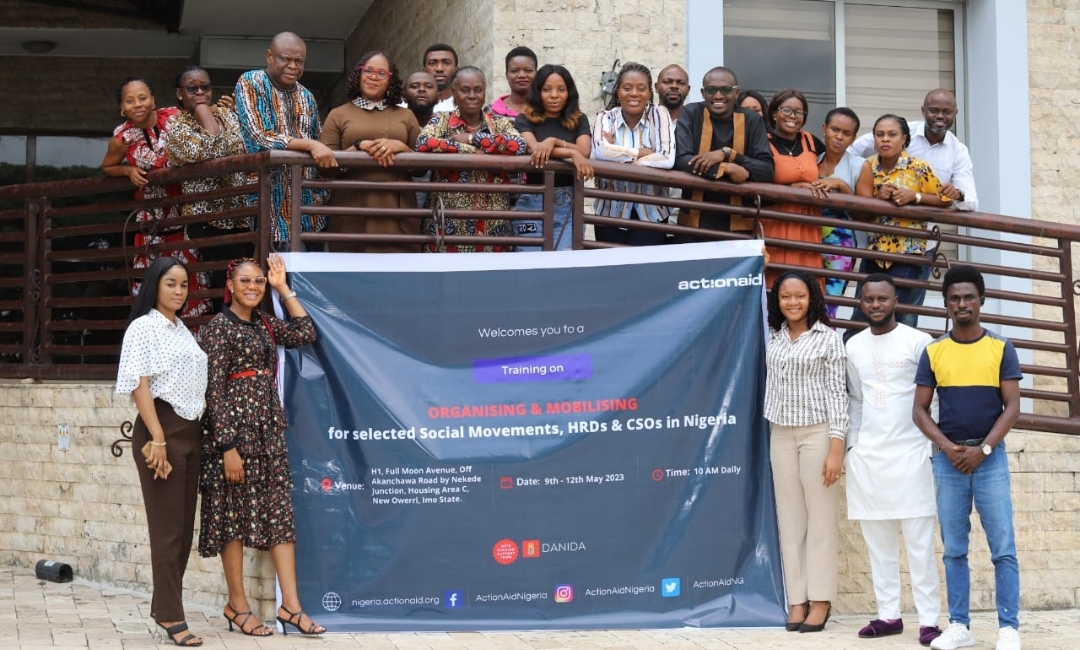By Patrick Obia
Social movements, activists, and journalists among others have been urged to collaborate and connect among themselves to fight against injustices and all forms of human rights violations in Nigeria.
This was the take-home message from a three-day “Organizing and Mobilizing Training for Selected Social Movements, Human Rights Defenders, and Civil Society Organizations in Nigeria”, organized by ActionAid.
Held in the conference hall of Full Moon Hotels, Owerri, the Imo State capital, participants who were drawn from the South-South, South-East, and South-West regions of the country identified that one must be passionate to effect change, be trained, have overall knowledge of movement to be embarked upon; utilizing the media among others as a panacea for achieving successful social movements.
In opening remarks to kickstart the training, ActionAid Nigeria Program Coordinator for the MOVE program, Kyauta Giwa welcomed and thanked participants for availing themselves for the workshop which is geared to help participants actively participate in the process of making the society a better place for all.
Speaking on the “Introduction to Human Rights Based Approach (HRBA), Josephine Adokwu said it is geared towards the overall interest and development of all.
Josephine said ensuring links across levels to address the structural causes of poverty and injustice; accountability and transparency, and working in partnership are some of the eight principles of the human rights-based approach of ActionAid. It also includes promoting the rights of women and approaches to development – charity, anti-poverty, basic needs, and empowerment.
Speaking on the “Movement”, a veteran, Jaye Gaskia inferred that sometimes movement can be inspired by moments.
He Journeyed memory lane of movements that have brought about social changes in Nigeria, such as the Aba women’s riot in 1920, the anti-military and pre-democracy struggle period in 1990, the operation occupy Nigeria in 2012, Abeokuta women’s revolt in 1947; the 2020 #EndSARS protest, the apartheid struggle in South Africa, Arab Spring in Algeria amongst others, “all led to positive changes” he said.
Facilitating “Galvanizing, Organizing and Leadership Development (GOLD) and the Movement Cycle”, the Program Coordinator – Kyauta Giwa echoed that social movement is not about individuals but for the overall justice of the society.
This assertion, she said, is needed to build cooperation, and consciousness across broad demographics, formulate grievances, and prepare for windows of opportunities (trigger events) among others.
On “Organizing”, Blessing Ifemenam averred that activists in social movements must organize themselves with a clear purpose and agenda to shift power and claim their rights in the process of rooted campaigning.
She said Non-Governmental Organizations (NGOs) and other powerful allies may support the organizing effort but they are not in the driving seat of the movement.
Other topics covered include NGO vs movement by Kyauta, sustaining social movements: notes on social organizing and mobilizing by Jaye Gaskia, art as a tool for social change by Kure Shekwoyemi and Ugochukwu Onuoha spoke on the art and act of communicating to inspire effective action.
Analysis of the Strength, Weaknesses of Threat (SWOT) and Specific, Measurable, Achievable, and Realistic (SMART) matrix, Josephine Adokwu advised participants to inculcate the matrix in their programs, campaigns, and movements.
High points of the highly interactive training were questions and answers sessions, practicals, group presentations, drafting of workable action plans, group photographs, and among others.

Leave feedback about this